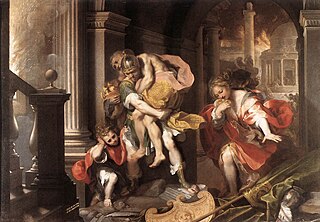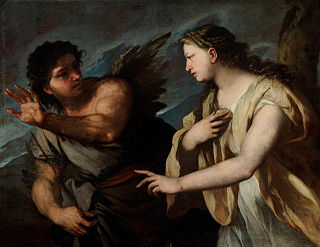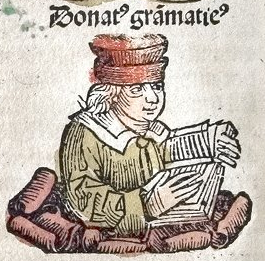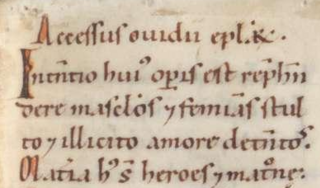
Publius Vergilius Maro, usually called Virgil or Vergil in English, was an ancient Roman poet of the Augustan period. He composed three of the most famous poems in Latin literature: the Eclogues, the Georgics, and the epic Aeneid. A number of minor poems, collected in the Appendix Vergiliana, were attributed to him in ancient times, but modern scholars consider his authorship of these poems to be dubious.

The Aeneid is a Latin epic poem that tells the legendary story of Aeneas, a Trojan who fled the fall of Troy and travelled to Italy, where he became the ancestor of the Romans. Written by the Roman poet Virgil between 29 and 19 BC, the Aeneid comprises 9,896 lines in dactylic hexameter. The first six of the poem's twelve books tell the story of Aeneas' wanderings from Troy to Italy, and the poem's second half tells of the Trojans' ultimately victorious war upon the Latins, under whose name Aeneas and his Trojan followers are destined to be subsumed.
In Greek mythology, Dardanus was the founder of the city of Dardanus at the foot of Mount Ida in the Troad.
Elymus was the supposed Trojan ancestor of the Elymians (Ἔλυμοι), an indigenous people of Sicily, in Greek and Roman legend.

Picus was a figure in Roman mythology, the first king of Latium. He was the son of Saturn, also known as Stercutus. He was the founder of the first Latin tribe and settlement, Laurentum, located a few miles to the Southeast of the site of the later city of Rome. He was known for his skill at augury and horsemanship.

Ascanius was a legendary king of Alba Longa and the son of the Trojan hero Aeneas and Creusa, daughter of Priam. He is a significant figure in Roman mythology because of his genealogy: as the son of the Roman founding father Aeneas, himself the son of the goddess Venus and the Trojan prince Anchises, he was regarded as an ancestor of the Roman people. Under his additional name Iulus, he was claimed as the particular ancestor of the gens Iulia, the family of Julius Caesar, and therefore a progenitor of the first line of Roman emperors, the Julio-Claudian dynasty. In some Roman genealogies, he is also made to be an ancestor of Romulus and Remus. Together with his father, he is a major character in Virgil's Aeneid.
In Greek mythology, the name Halaesus or Halesus may refer to:

In Greek and Roman mythology, Iapyx, Iapux or Iapis was a favorite of Apollo. The god wanted to confer upon him the gift of prophecy, the lyre, etc.; but Iapyx, wishing to prolong the life of his father, preferred the more tranquil art of healing to all the others.
In Roman mythology, the Aeneads were the friends, family and companions of Aeneas, with whom they fled from Troy after the Trojan War. Aenides was another patronymic from Aeneas, which is applied by Gaius Valerius Flaccus to the inhabitants of Cyzicus, whose town was believed to have been founded by Cyzicus, the son of Aeneas and Aenete. Similarly, Aeneades was a patronymic from Aeneas, and applied as a surname to those who were believed to have been descended from him, such as Ascanius, Augustus, and the Romans in general.

Servius, distinguished as Servius the Grammarian, was a late fourth-century and early fifth-century grammarian. He earned a contemporary reputation as the most learned man of his generation in Italy; he authored a set of commentaries on the works of Virgil. These works, In Tria Virgilii Opera Expositio, Commentarii in Virgilium, Commentarii in Vergilii Opera, or Vergilii Carmina Commentarii, constituted the first incunable to be printed at Florence, by Bernardo Cennini, in 1471.

The gens Julia was one of the most prominent patrician families in ancient Rome. Members of the gens attained the highest dignities of the state in the earliest times of the Republic. The first of the family to obtain the consulship was Gaius Julius Iulus in 489 BC. The gens is perhaps best known, however, for Gaius Julius Caesar, the dictator and grand uncle of the emperor Augustus, through whom the name was passed to the so-called Julio-Claudian dynasty of the first century AD. The nomen Julius became very common in imperial times, as the descendants of persons enrolled as citizens under the early emperors began to make their mark in history.

Quintus Curtius Rufus was a Roman historian, probably of the 1st century, author of his only known and only surviving work, Historiae Alexandri Magni, "Histories of Alexander the Great", or more fully Historiarum Alexandri Magni Macedonis Libri Qui Supersunt, "All the Books That Survive of the Histories of Alexander the Great of Macedon." Much of it is missing. Apart from his name on the manuscripts, nothing else certain is known of him. This fact alone has led philologists to believe that he had another historical identity, to which, due to the accidents of time, the link has been broken. A few theories exist. They are treated with varying degrees of credibility by various authors. Meanwhile, the identity of Quintus Curtius Rufus, historian, is maintained separately.

Aelius Donatus was a Roman grammarian and teacher of rhetoric.
Fabius Planciades Fulgentius was a Latin writer of late antiquity. Four extant works are commonly attributed to him, as well as a possible fifth which some scholars include in compilations with much reservation. His mythography was greatly admired and highly influential throughout much of the medieval period, though less influential today.

Marcus Claudius Marcellus was the eldest son of Gaius Claudius Marcellus and Octavia Minor, sister of Augustus. He was Augustus' nephew and closest male relative, and began to enjoy an accelerated political career as a result. He was educated with his cousin Tiberius and traveled with him to Hispania where they served under Augustus in the Cantabrian Wars. In 25 BC he returned to Rome where he married his cousin Julia, who was the emperor's daughter. Marcellus and Augustus' general Marcus Vipsanius Agrippa were the two popular choices as heir to the empire. According to Suetonius, this put Agrippa at odds with Marcellus, and is the reason why Agrippa traveled away from Rome to Mytilene in 23 BC.
Sedulius Scotus or Scottus was an Irish monk, teacher, Latin grammarian, and scriptural commentator who lived in the 9th century. During the reign of the Emperor Lothair (840–855), he was one of a colony of Irish teachers at Liège. Sedulius is sometimes called Sedulius the Younger, to distinguish him from Coelius Sedulius. The usual Irish form of the name is Siadhal, but he appears to have been called Suadbar. It is quite probable that towards the end of his days he went to Milan, following the example of his countryman Dungal, who established a school at Pavia. When and where he died is unknown.
An ars grammatica is a generic or proper title for surveys of Latin grammar. The first ars grammatica seems to have been composed by Remmius Palaemon, but is now lost. The most famous ars grammatica since late antiquity has been that composed by Donatus.
The secespita is a long iron sacrificial knife, made of brass and copper from Cyprus, with a solid and rounded ivory handle, which is secured to the hilt by a ring of silver or gold. The flamens and their wives, the flaminicae, who were priests and priestesses of the Ancient Rome, the virgins and the pontiffs made use of it for sacrifices. This knife derives its name from the Latin verb seco.

The accessus ad auctores was a literary genre of the Middle Ages. Originally, an accessus was the introduction at the beginning of a commentary on a classical author, containing background information on the author and his work. Beginning in the 12th century, these accessus were excerpted from the commentaries and published in separate collections. It is to these collections that modern scholars give the name accessus ad auctores. Invariably written in Latin, they were designed for the use of students of Latin grammar.
Pompeius Grammaticus, also known as Pompeius the Grammarian, was a Latin grammarian of the fifth century, author of a Commentary on Donatus's grammar.











